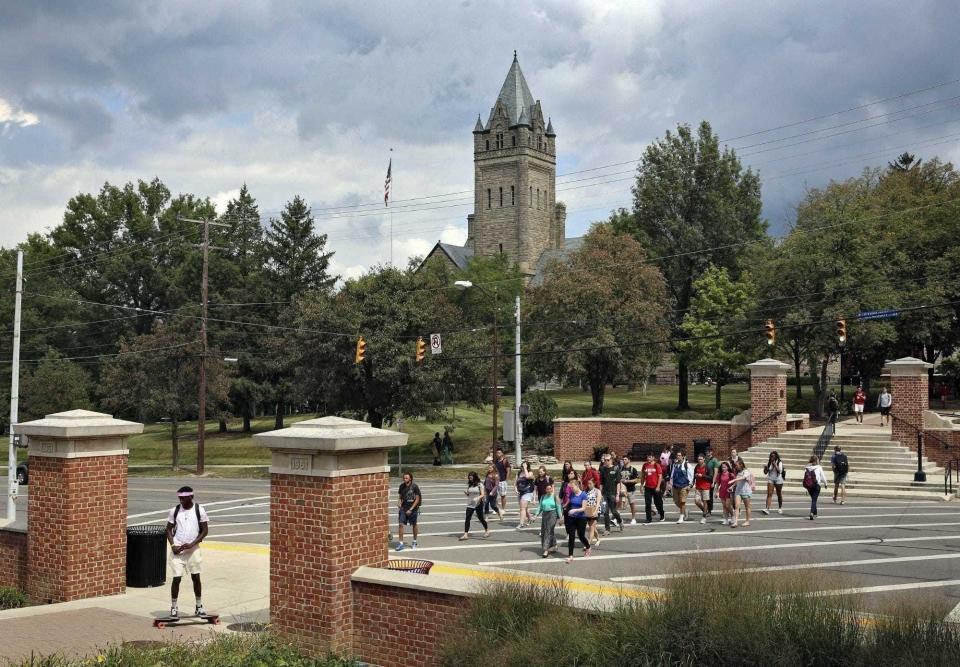Politicians are trying to undercut colleges. Despite the consequences, we must speak up.
I write out of deep concern for American higher education, and do so as the former president of both Ohio Wesleyan University and the National Association of Independent Colleges and Universities, whose membership consists of nearly 1,000 private college presidents.
Today we are witnessing a full-scale assault on the academy intended to diminish the role of higher education as an integral guiding force in our nation.
In a 1957 opinion on Sweezy v. New Hampshire, Supreme Court Justice Felix Frankfurter identified what he saw as the four freedoms essential to a university: “to determine for itself on academic grounds who may teach, what may be taught, how it shall be taught, and who may be admitted to study.”
All four of these principles are now under attack in more than 30 states across the country, according to PEN America. What we see, especially in Florida, are actions to usurp these fundamental university freedoms: legislation to censor courses; to remove public college and university presidents and their boards of trustees; and to restrict discussion of race, sex and gender issues in and out of the classroom.
It is increasingly difficult for public college presidents to speak out
Most recently, the search for president of Florida Atlantic University was suspended because of “anomalies,” though critics contend the real reason was that a legislative ally of the governor with no higher education experience was not among the finalists.
In Ohio, Senate Bill 83, passed in May, would impinge on intellectual freedom and compromise the principles of academic shared governance.

Ohio State University's Board of Trustees spoke out courageously against this legislation, and fortunately it has not yet become law.
If passed by the House, however, public university staff and employees would be banned from striking, college students would be required to take certain American history courses, faculty tenure reviews would include any evidence of “bias,” and board of trustees terms would be reduced from nine years to four.
Don't fail college students: Ending COVID SNAP benefits will leave many hungry
Across the country, public colleges and universities are facing similar hostile legislation to undercut their historic mission, eliminate curriculum subjects and limit academic freedom. It is increasingly difficult for public college presidents to speak out under these circumstances.
For those who do, the punitive response by many state legislatures has been to cut funding, replace the board of trustees, fire the president and arbitrarily appoint handpicked leadership of the institution.
Opinion alerts: Get columns from your favorite columnists + expert analysis on top issues, delivered straight to your device through the USA TODAY app. Don't have the app? Download it for free from your app store.
A group of concerned former college and university presidents – Champions of Higher Education – has organized to confront these challenges. The membership now numbers more than 200 and continues to grow. We are committed to write opinion pieces, address public gatherings and contact state legislators.
Private colleges and their presidents also need to speak up
There is also a key role here for private colleges and their presidents to speak out on behalf of their public college colleagues. It is urgent for us to take a stand of solidarity with them.
At some point, such attacks can limit the autonomy of private colleges as well, either through restrictive new laws or by repeal of legal protections.
Are school shootings rampant? As students head back to school, should parents worry about shootings? The math says no.
It is our obligation to make our views known in support of free speech and our endangered public college colleagues and their institutions. That obligation is both moral and practical.
I’m reminded of a profound statement by the German pastor Martin Niemöller who was imprisoned in a concentration camp until the end of World War II:“First they came for the socialists, and I did not speak out – because I was not a socialist. Then they came for the trade unionists, and I did not speak out – because I was not a trade unionist. Then they came for the Jews, and I did not speak out – because I was not a Jew. Then they came for me – and there was no one left to speak for me.”
Before it is too late, it is time to speak out in defense of Justice Felix Frankfurter’s "four essential freedoms" – and in support of American higher education.

David L. Warren, president of Ohio Wesleyan University from 1984 to 1993, served as president of the National Association of Independent Colleges and Universities from 1993 to 2019. He now lives in Washington, D.C. This column first published in The Columbus Dispatch.
You can read diverse opinions from our Board of Contributors and other writers on the Opinion front page, on Twitter @usatodayopinion and in our daily Opinion newsletter. To respond to a column, submit a comment to letters@usatoday.com.
This article originally appeared on The Columbus Dispatch: Political attacks put colleges in danger. Universities must speak out


